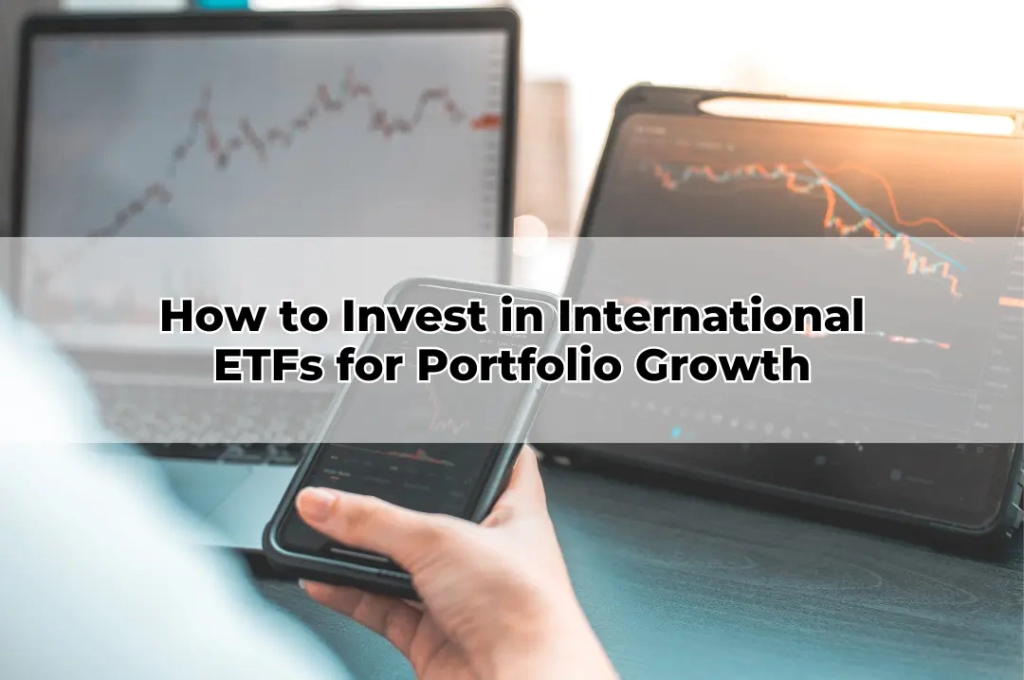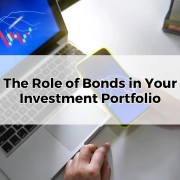How to Invest in International ETFs for Portfolio Growth
Table of Contents
ToggleInternational Exchange-Traded Funds (ETFs) are diversified investment vehicles that offer exposure to global markets without the complexity of directly purchasing foreign assets. These funds pool investor money and track international indices or sectors, trading on Australian or global stock exchanges. For Australians, international ETFs offer an efficient pathway to access growth in emerging markets, developed economies, or specific global industries such as technology, healthcare or infrastructure.
While traditional investments may offer stability through domestic equities or fixed income, international ETFs introduce geographical diversification—an essential strategy to mitigate country-specific risk. Investors benefit from broader macroeconomic trends, currency fluctuations, and sectoral booms occurring outside of Australia’s borders. Importantly, international ETFs can be purchased via Australian exchanges like the ASX through ETF
providers such as Vanguard, iShares, or BetaShares, simplifying the administrative burden for local investors.
Engaging a qualified financial adviser is critical before selecting international ETFs to ensure alignment with one’s investment objectives, risk appetite, and tax position. As a Toowoomba Financial Adviser, I frequently assist clients in navigating the nuanced structure of global ETFs
within SMSFs and diversified portfolios for long-term growth.
Benefits of Global Diversification
Diversification is one of the cornerstones of a resilient investment portfolio. By investing in international ETFs, investors gain exposure to economies with different growth cycles, regulatory environments, and consumer behaviours. This reduces reliance on the performance of the Australian market and introduces new sources of return potential.
The Australian share market represents approximately 2% of global equity markets. Limiting investments solely to local stocks can be unduly restrictive. International ETFs provide access to sectors underrepresented in Australia—such as global technology giants, renewable energy innovators, and advanced pharmaceuticals.
Moreover, diversification across geographic regions helps counterbalance risks associated with domestic downturns. While Australia’s economy may face headwinds due to policy changes, commodity cycles or natural disasters, other markets may thrive, providing a cushioning effect on overall returns.
For investors seeking professional guidance on executing such strategies, particularly within superannuation or SMSFs, it’s advisable to seek Retirement Financial Advice tailored to global diversification. As an Online Financial Adviser serving clients across Australia, I emphasise the long-term advantages of global exposure as part of a modern portfolio.
Choosing the Right International ETF
Not all international ETFs are created equal. The selection process should begin with a clear understanding of the ETF’s underlying index, geographical focus, and sectoral composition. Key considerations include the fund’s structure, management style (passive or active), historical performance, and cost-efficiency.
For example, some ETFs track broad indices like the MSCI World Index, offering exposure to developed markets across North America, Europe, and Asia. Others may concentrate on single-country equities, such as those in China or India, or specialised sectors like clean energy or artificial intelligence.
Expense ratios, or the ongoing management costs associated with the ETF, can erode returns over time. It’s crucial to assess whether the investment justifies its cost in relation to expected performance. Liquidity is another important metric—ETFs with higher trading volumes are generally easier to enter and exit.
Engaging with a trusted Toowoomba Financial Adviser ensures this selection process is both comprehensive and aligned to your financial objectives. Tailoring ETF choices to complement your existing portfolio requires not just research, but holistic Financial Planning in Toowoomba to optimise outcomes.
Currency Exposure and Hedging
Investing in international ETFs introduces currency exposure, which can be both a benefit and a risk. When Australian investors purchase global assets, returns are influenced by both the asset’s price performance and currency movements between the Australian dollar and foreign currencies.
Unhedged ETFs reflect foreign currency fluctuations. If the Australian dollar depreciates relative to the currency of the asset, returns are enhanced. Conversely, an appreciating Australian dollar may reduce the value of overseas holdings. Currency-hedged ETFs are designed to minimise this exchange rate risk, typically at a modest additional cost.
The choice between hedged and unhedged ETFs should reflect one’s investment horizon, risk profile, and view on currency trends. Short-term investors or those seeking capital stability may prefer hedged options. Long-term investors willing to absorb currency volatility in exchange for higher growth potential may favour unhedged alternatives.
As an Online Financial Adviser, I help clients navigate these choices by providing clear explanations of currency risk and aligning ETF choices with long-term strategies. Currency risk is complex, and proper guidance is critical in ensuring it complements—rather than detracts from—overall portfolio objectives.
Tax Implications of International ETFs
Taxation is a vital consideration when investing in international ETFs. These funds can generate foreign income, dividends, and capital gains—all of which have Australian tax implications. Additionally, investors may be subject to foreign withholding tax, depending on the country of origin of the ETF’s underlying assets.
Australian investors can often claim a Foreign Income Tax Offset (FITO) to reduce the impact of overseas tax paid on investment earnings. However, tax treatments vary depending on the ETF’s domicile, structure, and distribution type. For example, US-domiciled ETFs may carry more complex reporting requirements than those domiciled in Australia.
Capital gains from ETF sales are also taxable in Australia and subject to the 50% CGT discount if held for more than 12 months. Understanding when and how to sell international ETFs requires precise timing and tax awareness to minimise liabilities.
By partnering with a Toowoomba Financial Adviser, investors can receive tailored Financial Planning in Toowoomba to manage tax impacts proactively. Whether held in a personal portfolio, trust, or SMSF, strategic tax planning is essential to maximising net returns from international ETF investments.
Integrating International ETFs into SMSFs
Self-Managed Super Funds (SMSFs) provide a flexible structure to incorporate international ETFs. Trustees can access a diverse array of global assets while maintaining control over investment decisions. International ETFs are well suited to SMSFs seeking capital growth, global diversification, and liquidity.
However, SMSF trustees must ensure that the selected international ETFs align with the fund’s investment strategy, risk appetite, and compliance obligations under the SIS Act. Regulatory oversight, record-keeping, and valuation standards must be diligently observed, particularly for overseas investments.
Administrative considerations include foreign currency exposure, tax reporting, and custody arrangements. Trustees should also be cautious of liquidity risks and ensure assets can be readily converted to cash if required for pension payments or benefit withdrawals.
Working with a Toowoomba Financial Adviser who specialises in SMSFs ensures that international ETF investments are both compliant and strategically beneficial. At Wealth Factory, we support SMSF trustees in designing investment strategies that incorporate global exposure while remaining aligned to long-term superannuation goals.
Evaluating Performance Metrics
Investors must look beyond surface-level returns when evaluating international ETFs. Key performance metrics include tracking error, total return, risk-adjusted return (such as the Sharpe ratio), and yield consistency. These indicators provide a more nuanced view of how an ETF
performs relative to its benchmark and risk profile.
Tracking error measures how closely an ETF mirrors the performance of its underlying index. A low tracking error indicates that the fund is efficiently replicating the benchmark, which is especially important for passive investors.
Risk-adjusted returns offer insight into how much return is being generated for each unit of risk. High volatility may inflate returns temporarily but mask underlying instability. Consistent yield delivery—especially for income-focused investors—is also critical.
Ongoing monitoring of international ETFs is vital to ensure they continue to align with one’s investment thesis. Regular reviews with an Online Financial Adviser can help identify underperforming assets and reallocate capital to more efficient alternatives.
Using ETFs to Access Emerging Markets
Emerging markets present compelling growth opportunities driven by demographic expansion, industrialisation, and rising consumer demand. International ETFs provide a convenient and cost-effective way to gain exposure to countries like India, Brazil, Vietnam, and South Africa without direct investment hurdles.
These markets, while volatile, often deliver higher growth rates than developed economies. ETFs mitigate some of the risks through diversification across sectors and companies. They also help Australian investors overcome practical challenges such as foreign exchange restrictions, political instability, or unfamiliar regulatory systems.
Nevertheless, emerging market ETFs carry unique risks including currency volatility, governance concerns, and liquidity constraints. As such, their inclusion in a portfolio should be carefully weighted and often used as a satellite exposure rather than a core holding.
With proper guidance from a Financial Planning Toowoomba professional, investors can identify suitable ETFs that align with their return expectations and time horizon, while managing the heightened risk profile typical of emerging economies.
Sector-Specific International ETFs
Sector-specific ETFs allow investors to concentrate on industries with high growth potential or structural tailwinds. Popular sectors include technology, healthcare, green energy, infrastructure, and cybersecurity—many of which are underrepresented in the Australian market.
These ETFs offer exposure to global leaders and innovative companies shaping the future economy. For example, a global healthcare ETF may include pharmaceutical giants, biotech innovators, and medical equipment manufacturers across the US, Europe, and Asia.
Investors should assess the underlying holdings, geographical distribution, and sector volatility. Concentrated exposure increases potential upside but also magnifies drawdown risk. Sector ETFs are best used as tactical allocations within a broader diversified strategy.
As a Toowoomba Financial Adviser, I guide clients through sector-based investments, ensuring they fit the investor’s overall risk profile and investment objectives. These ETFs can be valuable tools for enhancing growth potential and responding to macroeconomic trends.
Risks and Volatility Considerations
International ETFs, while valuable, are not without risk. Market volatility, currency fluctuations, geopolitical instability, and economic shocks can impact performance. Political decisions, trade wars, and regulatory changes abroad may influence asset values unpredictably.
Investors must assess their own tolerance for risk and time horizon before committing to international ETFs. While the long-term trend for global equities is upward, short-term market movements can test even seasoned investors.
Building a portfolio that accommodates this volatility requires discipline and professional guidance. Diversifying across regions, sectors, and asset classes can help smooth returns. It’s also important to resist emotional decision-making during periods of market turbulence.
Working with a trusted Online Financial Adviser ensures that risk management strategies are in place, including periodic rebalancing, strategic allocation shifts, and appropriate cash buffers for income or short-term needs.
The Role of International ETFs in Retirement Planning
For those approaching or in retirement, international ETFs can play a crucial role in preserving purchasing power and generating growth. As retirees face longer life expectancies and inflationary pressures, global equity exposure offers the potential to outpace domestic-only portfolios.
International ETFs also help diversify income sources, particularly for SMSFs or account-based pensions. With global companies offering consistent dividends, retirees can supplement local income streams and reduce dependency on the Australian economy.
However, careful planning is required. Risk exposure must be moderated, and drawdown strategies should be designed with consideration for sequence-of-returns risk. Balancing growth potential with capital protection becomes paramount.
Engaging in Retirement Financial Advice with a professional Toowoomba Financial Adviser ensures that international ETFs are used effectively within a retirement plan—enhancing outcomes while managing the unique risks faced by retirees.
Final Thoughts on Global ETF Investing
International ETFs represent a dynamic and accessible way for Australian investors to enhance portfolio diversification, pursue global growth, and capture sectoral trends that are shaping the future. With prudent selection, robust risk management, and professional guidance, these instruments can provide superior long-term outcomes.
Whether you’re managing an SMSF, building a retirement strategy, or simply seeking to broaden your investment horizons, the inclusion of global ETFs can offer distinct advantages. However, success depends on more than choosing a trending ticker—it requires structured planning, ongoing review, and tailored advice.
As a Toowoomba Financial Adviser and SMSF specialist, I support clients with holistic Financial Planning in Toowoomba, delivering tailored strategies to make the most of international ETF opportunities. For a personalised approach to global investing, reach out to Wealth Factory today. Let’s grow your portfolio—globally.









